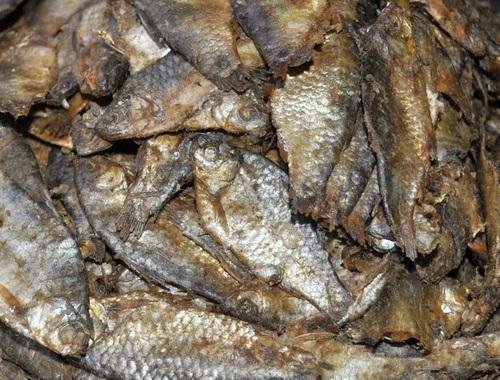Meetei Ngari, the fermented fish from Manipur is a traditionally processed food for ages. Culturally, Meetei Ngari is associated with religious functions like Saroi khangba and Ipan Thaba of the newly born child in Meetei society. Manipur was an independent Kingdom, covering the vast tract of modern-day Surma valley in Assam and Bangladesh, the Imphal Valley, and the Kabaw valley in Myanmar. Today, the production of Ngari is an important business in these regions.
The Meetei are known for making pottery since early civilization. The Chairel Chafu, Thongjao chafu and the Nongpok Sekmai chafu, the Longpi chafu are as old as 1000 years.
Ngari and Chafu are very much related. Without Chafu, Ngari can not be processed. Those processing Ngari in Assam, Bangladesh and Tripura are somehow related to the Meetei Ngari.
The Meetei who settled in the Surma valley of Assam and Bangladesh and those settled in Tripura has started the production of fermented fish Ngari in those regions.
Meetei Ngari is known by a different name in the Northeast region. In Tripura, it is known as Shidol. Ngari is known as hidol in Assam and Tungtap in Meghalaya.
Selecting Ngari Kharung, earthern pot
The Ngari kharung or earthern pot have the capacity of 40-50 kg. It is a wide mouth with deep cylinder. Normally, Ngari kharung are 3- 4 feet height. These kharung are smeared with vegetable oils like mustard and sunflower oil. The old kharung are very costly and they are smeared with oil once or twice.
However, the new pot have to be smeared with oil 8-10 times at a regular interval of one week. This process is to help the pot coated with oil and prevent the air flow during fermentation of fish.
The oily interiors also prevent the Ngari from sticking on the pot when processed. Once the pot are ready, the next step is to select the fish for fermentation.
Selecting the fish for making Meetei Ngari
Phabou Nga known as Puntius sophore (Ham) is generally used in making of Ngari. This small fish is available locally in the river and lakes of Manipur. Nowadays, for commercial production of the fermented fish, it is imported from Jagiroad in Assam, Sylhet in Bangladesh and other Indian cities.
The dried Phabou Nga are first sorted out manually to remove the snails and other fish which are not suitable for fermentation. Then these fish are carefully washed in clean water.
Normally river or pond water are used to wash the fish. This is mainly because the tap water might contains chlorine and other chemicals which will have indirect effect on Ngari.
The washed phabou are sun dried for a day or two. When the water has been totally drained from the fish, they are put inside the the kharung.
This process is the most crucial one. If we left the air gap within the fish, the fish will deteriorates. We will get phumai ( waste Ngari) which cannot be consumed. The fish must be compressed in such a way that it is compact with no air in the kharung.
To achieve this, the fish are pressed with a log or with our legs (covered with a polythene or gunny bags. The more we compress the fish tightly, the better quality of Ngari we will get for consumption.
The Ngari kharung are then sealed with crushed waste fish making a paste and covered with banana leaves or newspaper. The kharung are wrapped with strong wire to prevent the breaking.
In some place, these kharung are covered with soil beneath the earth surface by digging. Normally, we can keep them in a room corner. It takes about 6-10 months to get fresh tasty Ngari.
Everything is processed naturally, without involvement of any chemicals or artificial methods. However, Ngari are now processed using the microorganisms. This take hardly 40 -60 days to get the fish fermented.
Consumer prefer traditionally processed Meetei Ngari which is more tastier and healthier to consume.
Market of Meetei Ngari
Every household eat Ngari, the fermented fish. These days, packed Ngari are sold online and people are buying it from Amazon or other shopping e-com websites.
Meetei Ngari are priced at Rs 500-600 per kilogram. One kharung of ngari are sold at Rs 15,000 to 20,000. Price depends on the duration of how long the fish are fermented in the pot.
Health benefits of Meetei Ngari
Ngari are good immune booster. This fermented fish are probiotic in nature and contains high dose of amino acids. Ngari are anti oxidants as well.
These are consumed to treat many locally known diseases like dysentary and cholera.
Meetei ngari are used in preparation of Singju, Eromba, Morok Metpa, Kangsoi and Kangsu. In fact, the taste of Manipuri dishes are due to the presence of Ngari. Without Ngari, Manipuri dish will be nothing!

Naorem Mohen is a natural farmer, full-time blogger, and entrepreneur dedicated to promoting Manipur’s black rice Chakhao, local beverages, and edible mushrooms.
